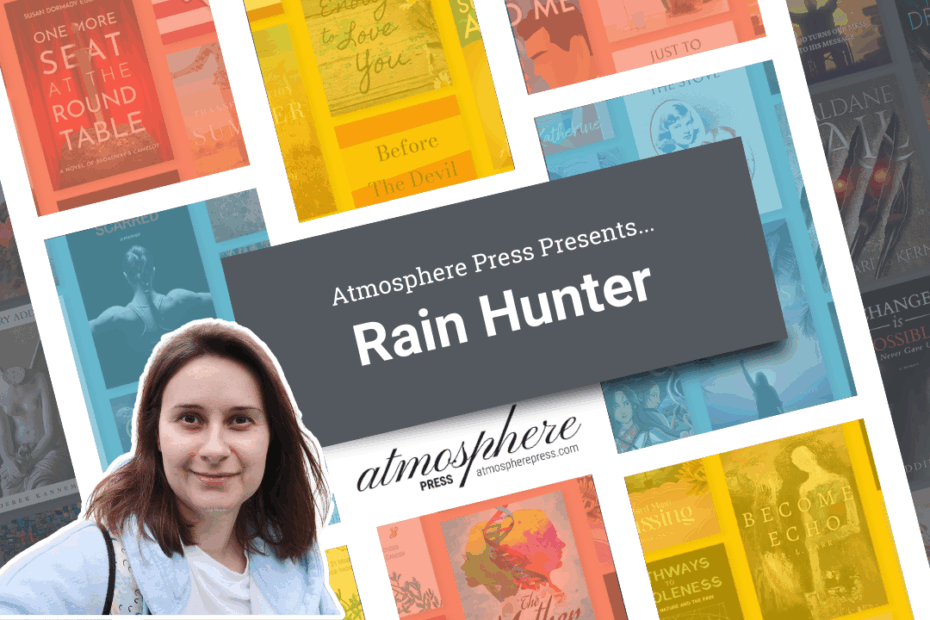An Interview with Rain Hunter

Sometimes it’s good to have a second personality. Rain Hunter is my alter ego, unleashed to roam wild and gory across the post-apocalyptic wasteland of The Synchrotron. She has a pitch-black sense of humour, a foul mouth, and zero tolerance for twats.
By day, I’m a former scientist with a background in materials chemistry, now working in the saner (but no less complex) world of intellectual property. Both sides of me live in Birmingham—a city full of grit, heart, bin bags, and endless inspiration for the end of the world. We have two cats, one kid and one husband that we have to share.
Who/what made you want to write? Was there a particular person, or particular writers/works/art forms that influenced you?
I’ve been an avid reader ever since I was 4 years old – coming from a non-English speaking background, I had the advantage of not having to deal with complicated English phonics. By 7, I’d devoured every reasonable book in our family library and moved on to my dad’s therapy manuals (he was a doctor). I guess those manuals (or the headache they induced) inspired me to come up with my own stories. I’ve never stopped since then.
What inspired you to start writing this book?
As a big fan of The Martian, I blame it all on Andy Weir. Once I walked along the corridor at Diamond Synchrotron with The Martian in my hand, wondering what Mark Watney would do if he were stuck not on Mars, but inside the synchrotron. If he managed to cook a rescue plan from shit and sticks (and some iridium catalyst), what amazing things could he do at Diamond?
But then, why would he be stuck at Diamond? That’s when zombies came into the equation – the monsters are a perfect reason to be stuck anywhere.
I also couldn’t allow Mark Watney to be a multifunctional NASA scientist – the Earthly researchers are rarely Botanists, Engineers and rock stars at the same time (I don’t count Brian May). I made my scientists very honest, very real-life, and very alcoholic.
Tell us the story of your book’s title. Was it easy to find, or did it take forever?
The Synchrotron. Easy-peasy! At first, it was called ID26, after the synchrotron beamline where most of the action takes place. But then, I decided to give the title some sci-fi clarity. Even if people have never heard about the real-life synchrotron, they would still associate “tron” with something scientific (from electron to “Ultron”, hehe).
If your book had a soundtrack, what are some songs that would be on it?
Like all writers, I have a playlist for each novel I write. The Synchrotron soundtrack reflects my eclectic music tastes, so the genres vary from pop (hello, Ava Max) to heavy (Five Finger Death Punch and Shinedown). I invite the readers to play Lauren Christy’s “The Colour of the Night” to taste the ending. Oldy but goldy.
What other professions have you worked in? What’s something about you that your readers wouldn’t know?
Coincidentally, I am one of those Earthly scientists with two PhD degrees, in Chemistry and Physics, which doesn’t mean I’m good at both. I have a healthy list of published papers, if you are into femtosecond spectroscopy-type bedtime reading, and I’ve done stand-up comedy, telling the audience all about rats with brain trauma.
As an ex-scientist, I swear by the authenticity of science in science fiction. It has to be honest, understandable and fun, otherwise – what’s the point? The Synchrotron’s scientists are its main juice – authentic, alcoholic, very narrowly specialised, heavily relying on Google, with a questionable approach to ethics and credibility. They are not trained for combat, they can’t do Astrophysics and Ballet dancing simultaneously, and they won’t always do the right thing.
But they will do everything they can.
What books did you read (for research or comfort) throughout your writing process?
I’m a big fan of gory serial-killer thrillers and often reread Donato Carrisi. His books are a true exploration of evil so grand that it grows bigger than a person and spreads over the world, like a pandemic. In contrast, The Synchrotron explores good that is so small and everyday that you can’t see it at first. What has more power – a grandiose evil or a tiny good? You decide.
What advice would you give your past self at the start of your writing journey?
Sometimes perfect does not exist. You can rewrite your book a million times and will never be ready to share it with the world. So don’t be ready. Just do it.
What’s one thing you hope sticks with readers after they finish your book?
I want the reader to feel everything the main characters feel at every moment of reading. The Synchrotron is a smashing ride through the volcano of emotions, so I want the ending to hit the reader on the head – was there an ending at all? What is an ending? Can there be an ending?
Are you a writer, too? Submit your manuscript to Atmosphere Press.

Atmosphere Press is a selective hybrid publisher founded in 2015 on the principles of Honesty, Transparency, Professionalism, Kindness, and Making Your Book Awesome. Our books have won dozens of awards and sold tens of thousands of copies. If you’re interested in learning more, or seeking publication for your own work, please explore the links below.
